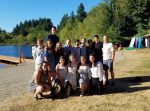Kids4Peace at Camp Solomon Schechter. (photo from k4p.org)
Camp Solomon Schechter (CSS), located outside of Olympia, Wash., was mired in controversy earlier this summer, after it temporarily flew a small Palestinian flag alongside the large American, Canadian and Israeli flags that usually wave above the camp. The flag was hoisted to welcome a delegation from Kids4Peace, which included Palestinian Muslim and Christian children. The children had come to the Jewish summer camp to foster friendship and understanding.
According to a source at the camp, the decision to raise the Palestinian flag was not a political one, but was intended as an expression of the mitzvah of welcoming guests (hachnassat orchim).
The 13 children from Kids4Peace, whose visit inspired the incident, spent five days at the camp, where they attended Jewish prayers every day and learned about Zionism and Israel. Founded in Jerusalem in 2002, Kids4Peace is “a global movement of youth and families dedicated to ending conflict and inspiring hope in divided societies around the world,” according to its website. The organization works with more than 500 Palestinian, Israeli and North American youth.
“It provided an opportunity for many American Jewish campers to meet a Palestinian for the first time, and to recognize that there are Palestinian partners who want to work – together – for peace,” Kids4Peace Northwest regional director Jordan Goldwarg wrote on the Kids4Peace blog about the camp visit. “It provided an opportunity for Palestinian Kids4Peace participants to experience American Jewish life and to gain a deeper understanding of why a strong, stable Israel is so important for Jews the world over.”
The flag incident was first publicized on the Mike Report, an amateur news blog hosted out of Seattle by right-wing, pro-Israel activist Mike Behar, who was highly critical of the actions of CSS. The news of the raising of a Palestinian flag sparked intense criticism online and among some parents and alumni, including many British Columbians connected to the camp. The apology subsequently issued on the CSS Facebook page was met with so many hostile comments that the page itself was taken offline for a time.
The incident attracted attention in American Jewish papers, as well. Tablet’s Leil Leibowitz, who acknowledged that, on one level, the flag raising was a “sweet gesture,” nevertheless wrote a fiery op-ed accusing CSS of addressing “the Israeli-Palestinian conflict in a mindless, morally preening way, treating it not as something concrete but as a collection of grand symbolic gestures,” and suggesting that training children on such empty theatrics would set them up to join “fringe anti-Israel groups” as adults.
In a letter sent to parents and supporters following the visit, the camp wrote: “For the sake of a teachable moment, we did raise the Palestinian flag as a sign of friendship and acceptance. It was met with uncertainty by some campers and staff, especially the Israeli’s [sic], but all understood that the message of hope for peace by flying the Israeli flag alongside helped develop empathy. Still we plan to take down all the flags for Shabbat since there is no peace and also to relieve the sadness and anger that some feel by the site [sic] of the flag.”
The letter also said the camp remains “unabashedly pro-Israel and we are celebrating Israel alongside our new friends.”
“Camp Solomon Schechter is a proud Zionist and pro-Israel camp,” a subsequent statement said. “We honour the Israeli army and Israeli people on a daily basis at CSS. Our goal was to create a safe space for all, and begin dialogue among the next generation.”
The camp’s executive director, Sam Perlin, and co-board president, Andy Kaplowitz, also issued a statement responding to the depth of the negative responses from some members of the community: “Camp Solomon Schechter regrets raising the Palestinian flag alongside U.S., Canadian and Israeli flags … we neglected to foresee in such actions the serious political implications and, for that lapse in judgment, we are deeply sorry.”
Kids4Peace released an official statement, saying that, “To some, the Palestinian flag evokes the failure of past negotiations, continued hostility toward Israel and a feeling that there is no partner for peace.
“At the same time, the Palestinian youth who came to camp are precisely those peace leaders who are reaching out to work with Israelis to counter incitement and build a new future on a foundation of mutual respect and understanding. These Muslim and Christian youth are also part of the Palestinian people, and they deserve only admiration and support.”
The statement also noted, “Unfortunately, most Americans and Israelis never encounter any pro-peace Palestinian voices. Instead, their perspectives are shaped by painful past experiences and media portrayals that reinforce negative views. But it is wrong to view all Palestinians as enemies of Israel or the Jewish people. That’s why Kids4Peace came to camp in the first place.”
Both the Israeli and American governments have flown Palestinian flags in gestures of welcome or goodwill. The White House flew the Palestinian flag when Palestinian President Mahmoud Abbas met with U.S. President Donald Trump earlier this year. Israel lifted its ban on flying the Palestinian flag in 1993 and there were Palestinian flags flown at the Knesset in 2013, when a Palestinian delegation visited. Likewise, at a ceremony thanking all those who helped douse the wildfires in Israel’s north in 2016, the Palestinian flag was flown at an Israeli air base, next to the flags of Turkey, Russia and Greece.
Matthew Gindin is a freelance journalist, writer and lecturer. He writes regularly for the Forward and All That Is Interesting, and has been published in Religion Dispatches, Situate Magazine, Tikkun and elsewhere. He can be found on Medium and Twitter. This article was originally published by CJN.

